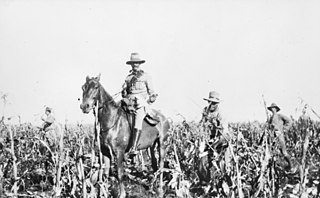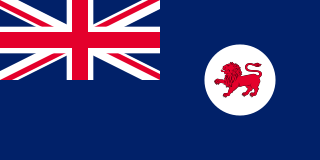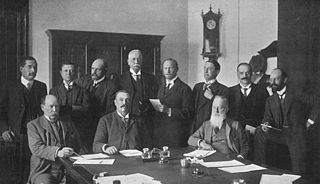
The Second Boer War, also known as the Boer War, Transvaal War, Anglo–Boer War, or South African War, was a conflict fought between the British Empire and the two Boer republics over the Empire's influence in Southern Africa.

The Union of South Africa was the historical predecessor to the present-day Republic of South Africa. It came into existence on 31 May 1910 with the unification of the Cape, Natal, Transvaal, and Orange River colonies. It included the territories that were formerly part of the South African Republic and the Orange Free State.

The Transvaal Colony was the name used to refer to the Transvaal region during the period of direct British rule and military occupation between the end of the Second Boer War in 1902 when the South African Republic was dissolved, and the establishment of the Union of South Africa in 1910. The borders of the Transvaal Colony were larger than the defeated South African Republic. In 1910 the entire territory became the Transvaal Province of the Union of South Africa.
Black Week refers to the week of Sunday 10 December – Sunday 17 December 1899 during the Second Boer War, when the British Army suffered three devastating defeats by the Boer Republics at the battles of Stormberg on Sunday 10 December, Magersfontein on Monday 11 December and Colenso on Friday 15 December 1899. In total, 2,776 British soldiers were killed, wounded and captured during this period.
The history of the Australian Army is the culmination of the Australian Army's predecessors and its 120-year modern history. The Army has its origins in the British Army and colonial military forces of the Australian colonies that were formed prior to the Federation of Australia. These were gradually united into federal units between 1899 and 1903; thus forming the beginning of the Australian Army. The colonial forces were combined and formed the basis of the new army, when the Commonwealth of Australia was founded on 1 January 1901. The modern history of the Army began with its founding at the start of the 20th century as the colonial armies were officially united as the Commonwealth Military Forces. In 1916 the title 'Australian Military Forces' was adopted and remained its official name until 1980, after which it became known as the Australian Army.

The South African Constabulary (SAC) was a paramilitary force set up in 1900 under British Army control to police areas captured from the two independent Boer republics of Transvaal and Orange Free State during the Second Boer War. Its first Inspector-General was Major-General Robert Baden-Powell, later the founder of the worldwide Scout Movement. After hostilities ended in 1902, the two countries became British colonies and the force was disbanded in 1908.

Major-General Sir Edward Yewd Brabant, was a British military commander in colonial South Africa. He served in the 9th Xhosa War (1877–1878), First Matabele War (1893–1894), and other campaigns. During the Second Boer War (1899–1902), he commanded the Colonial Division in 1900, and the Colonial Defence Force of Cape Colony in 1901.

The Queen's South Africa Medal is a British campaign medal awarded to British and Colonial military personnel, and to civilians employed in an official capacity, who served in the Second Boer War in South Africa. Altogether twenty-six clasps were awarded, to indicate participation in particular actions and campaigns.

Until Australia became a Federation in 1901, each of the six colonies was responsible for its own defence. From 1788 until 1870 this was done with British regular forces. In all, 24 British infantry regiments served in the Australian colonies. Each of the Australian colonies gained responsible government between 1855 and 1890, and while the Colonial Office in London retained control of some affairs, and the colonies were still firmly within the British Empire, the Governors of the Australian colonies were required to raise their own colonial militias. To do this, the colonial Governors had the authority from the British crown to raise military and naval forces. Initially these were militias in support of British regulars, but British military support for the colonies ended in 1870, and the colonies assumed their own defence. The separate colonies maintained control over their respective militia forces and navies until 1 March 1901, when the colonial forces were all amalgamated into the Commonwealth Forces following the creation of the Commonwealth of Australia. Colonial forces, including home raised units, saw action in many of the conflicts of the British Empire during the 19th century. Members from British regiments stationed in Australia saw action in India, Afghanistan, the New Zealand Wars, the Sudan conflict, and the Boer War in South Africa.

Ernest Alfred Roberts was an Australian politician and soldier who was a Labor member of the South Australian House of Assembly from 1896 to 1902 and 1905 to 1908 and then the Australian House of Representatives from 1908 to 1913. Roberts also served as an officer in South Africa during the Second Boer War, with South Australian colonial forces in 1900 and Commonwealth forces in 1902. From 1904 to 1908 he was the editor of The Herald, a left-wing newspaper published by the United Labor Party (ULP).

The South African Wars, including but also known as the Confederation Wars, were a series of wars that occurred in the southern portion of the African continent between 1879 and 1915. Ethnic, political, and social tensions between European colonial powers and indigenous Africans led to increasing hostilities, culminating in a series of wars and revolts, which had lasting repercussions on the entire region. A key factor behind the growth of these tensions was the pursuit of commerce and resources, both by countries and individuals, especially following the discoveries of gold in the region in 1862 and diamonds in 1867.

The Australian Commonwealth Horse (ACH) was a mounted infantry unit of the Australian Army formed for service during the Second Boer War in South Africa in 1902 and was the first expeditionary military unit established by the newly formed Commonwealth of Australia following Federation in 1901. Over 4,400 men enlisted in the ACH in three contingents, with troops and squadrons raised in each state and combined to form battalions. Eight battalions were raised, with the first arriving in Durban in March 1902. The 1st and 2nd battalions saw limited active service, conducting patrols against the Boers during the last great drives that ultimately ended the war. The war ended before the remaining battalions arrived to see action, and by the time peace came on 31 May 1902, the majority of the third contingent, consisting of the 5th, 6th, 7th and 8th Battalions, still remained at sea bound for South Africa. The ACH suffered no fatal casualties in action, although 28 men died from illness.

The Colony of Tasmania was a British colony that existed on the island of Tasmania from 1856 until 1901, when it federated together with the five other Australian colonies to form the Commonwealth of Australia. The possibility of the colony was established when the Parliament of the United Kingdom passed the Australian Constitutions Act in 1850, granting the right of legislative power to each of the six Australian colonies. The Legislative Council of Van Diemen's Land drafted a new constitution which they passed in 1854, and it was given royal assent by Queen Victoria in 1855. Later in that year the Privy Council approved the colony changing its name from "Van Diemen's Land" to "Tasmania", and in 1856, the newly elected bicameral parliament of Tasmania sat for the first time, establishing Tasmania as a self-governing colony of the British Empire. Tasmania was often referred to as one of the "most British" colonies of the Empire.

The military history of Australia during the Boer War is complex, and includes a period of history in which the six formerly autonomous British Australian colonies federated to become the Commonwealth of Australia. At the outbreak of the Second Boer War, each of these separate colonies maintained their own, independent military forces, but by the cessation of hostilities, these six armies had come under a centralised command to form the Australian Army.

The New South Wales Imperial Bushmen was a mounted regiment, consisting of six rifle squadrons, raised in the New South Wales colony for service during the Second Boer War.
The Queensland Citizen Bushmen, also known as the 3rd Queensland Mounted Infantry, was a mounted infantry regiment raised in Queensland for service during the Second Boer War. Formed as part of the third Queensland contingent with an original strength of 316 men, it departed for South Africa on 2 March 1900 aboard the Duke of Portland. Under the command of Major Walter Tunbridge, it initially served in Rhodesia, and later in west Transvaal, where it took part in the Relief of Mafeking, and actions at Koster River and Elands River. It then served in northern Transvaal, including actions at Rhenoster Kop and Wolwekuil, and the advance on Pietersburg. Fatal casualties included three men killed or died of wounds, and five dead from disease. The unit returned to Australia in June 1901 on the Morayshire.

The South Australian Mounted Rifles (SAMR) was a mounted infantry unit of the Colony of South Australia that served in the Second Boer War. The first contingent of South Australian Mounted Rifles was raised in 1899, followed by a second contingent in 1900.

The National Convention, also known as the Convention on the Closer Union of South Africa or the Closer Union Convention, was a constitutional convention held between 1908 and 1909 in Durban, Cape Town and Bloemfontein. The convention led to the adoption of the South Africa Act by the British Parliament and thus to the creation of the Union of South Africa. The four colonies of the area that would become South Africa - the Cape Colony, Natal Colony, the Orange River Colony and the Transvaal Colony - were represented at the convention, along with a delegation from Rhodesia. There were 33 delegates in total, with the Cape being represented by 12, the Transvaal eight, the Orange River five, Natal five, and Rhodesia three. The convention was held behind closed doors, in the fear that a public affair would lead delegates to refuse compromising on contentious areas of disagreement. All the delegates were white men, a third of them were farmers, ten were lawyers, and some were academics. Two-thirds had fought on either side of the Second Boer War.
The South Australian Bushmen was a mounted infantry squadron of the Colony of South Australia that served in the Second Boer War, the third contingent contributed by the colony.
The Australian Regiment was a regiment of troops from the Australian colonies that served in the Second Boer War. It began its existence as infantry but was soon mounted due to the conditions of the war.














